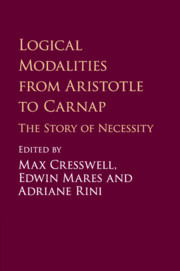Book contents
- Frontmatter
- Contents
- List of Figures and Tables
- List of Contributors
- List of Abbreviations
- Introduction
- 1 Aristotle on the Necessity of the Consequence
- 2 Aristotle on One- Sided Possibility
- 3 Why Does Aristotle Need a Modal Syllogistic?
- 4 Necessity, Possibility, and Determinism in Stoic Thought
- 5 Necessity in Avicenna and the Arabic Tradition
- 6 Modality without the Prior Analytics: Early Twelfth Century Accounts of Modal Propositions
- 7 Ockham and the Foundations of Modality in the Fourteenth Century
- 8 Theological and Scientific Applications of the Notion of Necessity in the Mediaeval and Early Modern Periods
- 9 Locke and the Problem of Necessity in Early Modern Philosophy
- 10 Leibniz's Theories of Necessity
- 11 Leibniz and the Lucky Proof
- 12 Divine Necessity and Kant's Modal Categories
- 13 Charles Sanders Peirce on Necessity
- 14 The Development of C. I. Lewis's Philosophy of Modal Logic
- 15 Carnap's Modal Predicate Logic
- Bibliography
- Index
5 - Necessity in Avicenna and the Arabic Tradition
Published online by Cambridge University Press: 05 September 2016
- Frontmatter
- Contents
- List of Figures and Tables
- List of Contributors
- List of Abbreviations
- Introduction
- 1 Aristotle on the Necessity of the Consequence
- 2 Aristotle on One- Sided Possibility
- 3 Why Does Aristotle Need a Modal Syllogistic?
- 4 Necessity, Possibility, and Determinism in Stoic Thought
- 5 Necessity in Avicenna and the Arabic Tradition
- 6 Modality without the Prior Analytics: Early Twelfth Century Accounts of Modal Propositions
- 7 Ockham and the Foundations of Modality in the Fourteenth Century
- 8 Theological and Scientific Applications of the Notion of Necessity in the Mediaeval and Early Modern Periods
- 9 Locke and the Problem of Necessity in Early Modern Philosophy
- 10 Leibniz's Theories of Necessity
- 11 Leibniz and the Lucky Proof
- 12 Divine Necessity and Kant's Modal Categories
- 13 Charles Sanders Peirce on Necessity
- 14 The Development of C. I. Lewis's Philosophy of Modal Logic
- 15 Carnap's Modal Predicate Logic
- Bibliography
- Index
Summary
Introduction
The expression ‘Arabic logic’ is used by scholars to cover a tradition of writing over a period stretching from the eighth century to the present day. The treatises and handbooks that belong to this tradition were written in various languages, including Arabic, Persian, Turkish, Hebrew, and Urdu. The central figures are Alfarabi (d. 950), Avicenna (d. 1037) and Averroes (d. 1198) (Street 2013a, introduction). Because of limitations of space, this chapter will omit Alfarabi, discussing only Avicenna and some of the more significant thinkers (including Averroes) whose work is based on, or reacts against, the latter's logical theories.
Avicenna
Avicenna uses the term ‘necessary’ to mark out (a) a class of beings, and (b) a class of propositions. His doctrine of the unique Necessary Being from which all contingent beings are derived is well known. Contingent beings are described as ‘possible’; but ‘possible’ here means two-sided possibility. A contingent being is one that can either exist or not exist. Whether it exists depends on a cause external to it. A necessary existent is one that cannot not exist, because its existence does not depend on anything external:
TEXT 1. And so we say that the things that fall under ‘being’ can be divided by the intellect into two groups. One of these comprises things which, when considered by themselves, do not possess necessary being; and it's clear also that their being is not impossible, otherwise they would not fall under ‘being’, and these are contained in the term ‘possibility’. The other comprises those which when considered by themselves possess necessary being. And so we say that a being which is necessary by itself does not have a cause, and that what is possible by itself has a cause.(Avicenna 1977, I, 6, 8 ff)
What is the connection between the usage of ‘necessary’ as a predicate of beings and its usage as a predicate of propositions? There is some evidence that, in Avicenna's view, the first usage is a particular case of the second – that to say a being is necessary is to say that the proposition expressing the being's existence is a necessary proposition. Avicenna's standard example of a proposition which is absolutely necessary is a proposition about the Necessary Being, namely, the proposition ‘God exists’ (Street 2004, 551).
- Type
- Chapter
- Information
- Logical Modalities from Aristotle to CarnapThe Story of Necessity, pp. 91 - 112Publisher: Cambridge University PressPrint publication year: 2016
- 19
- Cited by

